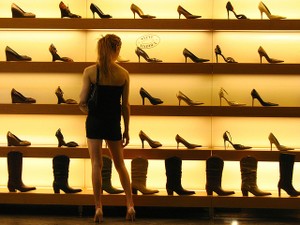Do you feel an irresistible pull to the mall and own far more shoes than you reasonably need? Do you spend a lot of your time thinking about money and shopping and juggling the books to continue your spending ways? Does your buying habit cause you problems, either financial or with those you love? Do you think you might have a serious problem with shopping…?
Although we may consider ourselves a nation of shoppers, for about 1 in 20 of us, the way we shop and buy has gone beyond the range of normal and results in significant consequences to wellbeing and financial solvency. For about 5% of us, our shopping behaviors are actually a mental illness that requires treatment.
Compulsive buying is also known as compulsive shopping, shopping addiction, shopoholism and oniomania. Most experts consider compulsive shopping to be a form of impulse control disorder (not otherwise specified).
If you have a compulsive buying disorder you experience regular powerful urges to shop or buy that are very difficult to resist, and because of the time and money you spend on buying, you very likely experience financial or relationship problems. Although you likely shop as a way to deal with negative emotions, and although buying can make you feel very good temporarily, buying usually results in feelings of guilt and remorse, which can in turn restart the compulsive cycle.1
Prevalence – How Big Is the Problem and Who’s at Risk?
The prevalence of compulsive buying in the general population ranges from 1% to 6% in research studies. Women are far more likely to have this type of impulse control disorder (90%).2
Compulsive buying typically emerges in a person’s late teens or early twenties and is generally a chronic or lifelong problem. People with a compulsive buying disorder are also likely to experience another co-occurring psychiatric issue, such as substance abuse, another impulse control disorder, depression, anxiety, eating disorders and obsessive compulsive disorders.
Warning Signs, Treatment and Self Help
According to the Illinois Institute for Addiction Recovery, some warning signs that may indicate a compulsive buying disorder include:
- Using buying or shopping as a way to relieve negative emotions
- Your buying is causing you some serious problems in your life
- Experiencing negative emotions after buying (remorse, guilt, shame, confusion etc.)
- Needing to have your credit cards on you at all times
- Buying on credit things you wouldn’t likely buy with cash
- Experiencing relationship conflicts over your spending habits
- Feeling preoccupied with money
- Hiding or lying about what you buy or how much you spend
- Feeling a high (euphoria) when buying
- Juggling your finances to accommodate your spending habits3
Recognizing 4 or more of these behaviors in yourself may indicate a problem.
Compulsive Shopping Disorder Treatment
Because research into the disorder has only really begun to accelerate within the last decade or so, there have been few rigorous studies done on the efficacy of differing treatment methods for compulsive buyers.
The two most commonly used treatment methods are:
- Psychotherapy using cognitive behavioral therapy (CBT)
- Medication using anti depressants 4
Because compulsive buying can so often result in financial and relationship problems, other types of interventions that can be beneficial include:
- Credit or financial counseling
- Relationship therapy
Because compulsive buying disorder often co-occurs with other psychiatric disorders, it’s also important to receive a full psychiatric assessment and screening to identify, and if necessary treat, any undiagnosed disorders.
Self Help
According to April Lane Benson, Ph.D., an expert on the treatment of compulsive buying disorder, one thing that you can do on your own to take control of your buying behaviors is to be conscious about your shopping. She recommends writing down 6 questions on a card and then before buying something asking yourself:
- Do I need this?
- Why am I here?
- How do I feel?
- How will I pay for this?
- What if I wait?
- Where will I put this? 5
She also recommends that you take note of what emotions trigger your urges to buy and to then think of solutions that will truly meet your needs. For example, if your shopping urges are triggered by feelings of loneliness, rather than buying as a quick way to feel good, you could instead take steps to increase the relationships in your life by joining a club or by volunteering, for example.
Parkinson’s Medications
People taking dopamine-agonists medications for the treatment of Parkinson’s are between 2 and 3.3 times more likely to experience an impulse control disorder than the general population – and the most likely impulse control disorder experienced by Parkinson’s medication patients is compulsive buying disorder. 6
- References
Page last updated Jun 24, 2012


